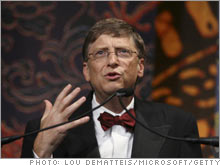Bill Gates: The way we givePhilanthropy can step in where market forces don't. Using technology to improve people's lives is our aim.(Fortune Magazine) -- This essay is adapted from a speech that Microsoft chairman Bill Gates delivered recently at the Tech Museum of Innovation in San Jose. Gates received that museum's James C. Morgan Global Humanitarian Award for his philanthropic work through the Bill & Melinda Gates foundation. I always thought philanthropy was something I would do when I was much older, after I retired. However, as Microsoft became increasingly successful, I realized that the amount of money I would be able to give back to society as I got older was steadily increasing.
One of the people who helped me start to think about how to give back in the smartest way was Warren Buffett. He told me he didn't think it was a good idea to give so much wealth to children, and I agreed with him. Of course, my children weren't old enough to understand the implications and argue against that idea. I also thought that doing philanthropy and running a company at the same time might make me a little crazy. After all, during the day I'd make money, and then at night I'd go home and give it away. I was worried I'd get confused about which thing I was doing and why. But some things happened that persuaded me to start serious philanthropy. One was working with the United Way. I learned about the United Way when I was young, because my mother was very active in it; she would talk about the campaigns she was running and how the money was being divided up among different organizations. We talked about the tension between local social services and things like disease research. We talked about how much of our allowances we should be giving to the church, to the Salvation Army. From the very earliest days at Microsoft (Charts), we used our United Way campaign to draw employees together and help them to see outside our world - to see the entire community and understand the needs of the most vulnerable people in it. We wanted to make this outward-looking worldview a part of our culture. In the last few years, we've developed a tool that helps our employees look for volunteer opportunities and instituted a program that matches their philanthropic giving. Last year, with these matching funds, the people at Microsoft donated more than $68 million and more than 100,000 hours of their own time. Many of the people who have volunteered and made donations have taken on major roles with charitable organizations. In the end, these experiences make them better employees. Economic inequality Still, for many years, I thought of myself as focused exclusively on work that would help the business. But one day my wife, Melinda, and I were reading an article about millions of children in poor countries who die from diseases that have been eliminated in this country. These included a disease I'd never even heard of - rotavirus - and the article said rotavirus was killing half a million kids each year. I thought, That can't be right. I read the news all the time. I read about plane crashes and freak accidents. Where is the news about these half-million kids dying? It's hard to escape the conclusion that in our world, some lives are seen as worth saving, but others are not. And that realization really forced us not only to start our philanthropy earlier but also to make reducing inequity the central priority of our giving. We want the world to allocate its resources knowing that the death of a child in a poor country is every bit as tragic as that of a child in a rich country. The principle that every human life has equal worth guides us to look for the most effective ways to reduce the suffering that comes as a result of inequality. To us, that means improving economic opportunity and health in developing countries, as well as education in the United States. Public health is amazing. It's not just about saving lives. As health improves, life improves by every measure. Every other problem you're dealing with - education, transportation - becomes far easier to manage. As you improve health, literacy goes up dramatically, people have smaller families, and all of the factors that drive a stable, prosperous society come together. When it comes to health, technology is the key to getting us from where we are to where we want to be. Discovery, development, delivery: All of those things take technology. But sometimes, despite our best intentions, just applying technology to problems doesn't fix them. |
|


